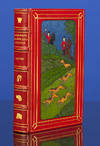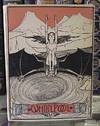
Critical Dialogue between Aboo and Caboo on a New Book;: or a Grandissime Ascension. Edited by E. Junius.
by [ROUQUETTE, Abbe Adrien]
- Used
- Paperback
- first
- Condition
- See description
- Seller
-
Sheffield, Massachusetts, United States
Payment Methods Accepted
About This Item
CREOLES "SLANDEROUSLY MISPREPRESENTED"
[ROUQUETTE, Abbe Adrien E.] Critical Dialogue between Aboo and Caboo on a New Book; or a Grandissime Ascension. Edited by E. Junius. 8vo, original printed brown wrappers, lettered in black, pp. 24. Mingo City [i.e. New Orleans]: Great Publishing House of Sam Slick Allspice, 12 Veracity Street, 1880.
First Edition. Written anonymously by the author of La Nouvelle Atala ou, La fille de l'Esprit: Legende Indienne, par Chahta de la Louisiane (1879), wherein is contained Lafcadio Hearn's first book appearance. This is a vicious response to George Washington Cable's, The Grandissimes by a Louisiana Creole writer, poet and Catholic missionary to the Choctaw Indians. Cable's
Old Creole Days was received coolly in New Orleans, but "The backlash commenced, months later, with the publication of Cable's next book, The Grandissimes. Serialized in Scribner's Monthly beginning in the November 1879 edition and running for the following eleven issues. The novel, subtitled 'A Story of Creole Life,' became Cable's grand work, and was quickly recognized, by the author and his audience, as such...Cable's novel is a drawn-from life narrative of New Orleans's Creoles, white, black, and every jumble of blood union and mixed-up family tree in between...Cable's story of The Grandissime brothers fomented hateful reactions. Just months following its 1880 publication, an anonymous pamphlet, printed in English under the pseudonym E. Junius, offered a ferociously satirical look at Cable's novel...In twenty-four short pages, a Critical Dialogue between Aboo and Caboo...managed to lampoon The Grandissimes' carbon-copy characters with an exchange between a white Creole and his ghostly twin; lambast Cable's historical knowledge, French language ability, and literary artistry; and insult the author-and his editors, audience, and, yes, even his mother-in just about every conceivable fashion... [it] exemplified a Southern sentiment...that any representations of the South written by or published in the North were hostile to the former Confederate States. 'It has been, evidently, most submissively, written FOR the prejudiced and inimical North,' Rouquette wrote, 'against
the olden customs, habits, manners and idiosyncrasies of the Southern Creole population of Louisiana, therein so slanderously misrepresented.'...Cable is 'the unfledged dwarf who has insulted a noble population...What remains most astonishing about Aboo and Caboo is the vehemence that Rouquette unleashed against Cable. In the dialogue, Aboo articulates a desire to burst Cable's soaring bubble: 'It might be with a dagger-pen, or it might be with the still more inflictive fouet sanglant [bloody whip] of indignation.' No, Caboo asserts, strike deeper, with more vicious intent to harm; 'Why not with a scalping knife, [sic] a bloody hatchet, or any other savage instrument of slow and ruthless torture? I would not stoop to crush the venom-swollen, dust-covered insect, suddenly brought to light by his interested fellows."- Rien T. Fertel, Thesis for Ph.D degree in Philosophy, Imagining the Creole City: White Creole Print Culture, Community, and Identity Formation in Nineteenth-Century New Orleans (Tulane University, 2013), pp. 146-150. As for Rouquette, who Cable had praised several years earlier as the "sweet woodland poet," and a scribe of "beautiful lines," Fertel says Aboo and Caboo endures as a consummate and mysterious outlier in his bibliography." It needs to be said that Rouquette (1813-1887) became insane in the later years of his life, which, of course, depending on its onset, could explain this vicious pamphlet written seven years before his death. Wrappers with very minor edge wear, leaves mildly toned, albeit an excellent copy, as issued. Thompson
1971. 84647
Reviews
(Log in or Create an Account first!)
Details
- Seller
- Howard S. Mott, Inc
(US)
- Seller's Inventory #
- 1222
- Title
- Critical Dialogue between Aboo and Caboo on a New Book;
- Author
- [ROUQUETTE, Abbe Adrien]
- Format/Binding
- Original printed wrappers
- Book Condition
- Used
- Quantity Available
- 1
- Edition
- First
- Binding
- Paperback
- Place of Publication
- [New Orleans]
- Date Published
- 1880
- Pages
- 24
- Size
- 8vo
- Weight
- 0.00 lbs
- Keywords
- Creoles
Terms of Sale
Howard S. Mott, Inc
About the Seller
Howard S. Mott, Inc
About Howard S. Mott, Inc
Glossary
Some terminology that may be used in this description includes:
- Wrappers
- The paper covering on the outside of a paperback. Also see the entry for pictorial wraps, color illustrated coverings for...
- New
- A new book is a book previously not circulated to a buyer. Although a new book is typically free of any faults or defects, "new"...
- Leaves
- Very generally, "leaves" refers to the pages of a book, as in the common phrase, "loose-leaf pages." A leaf is a single sheet...



